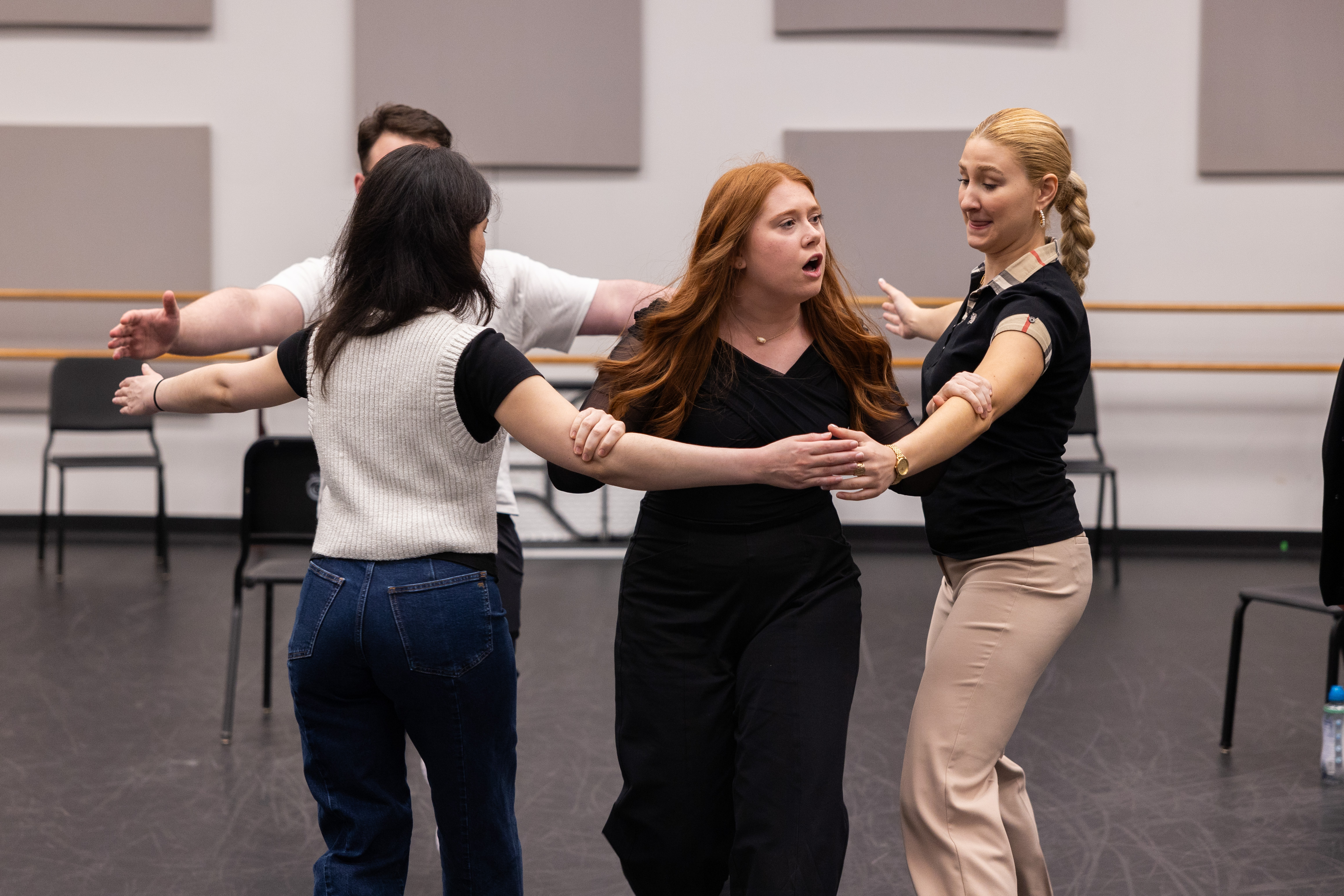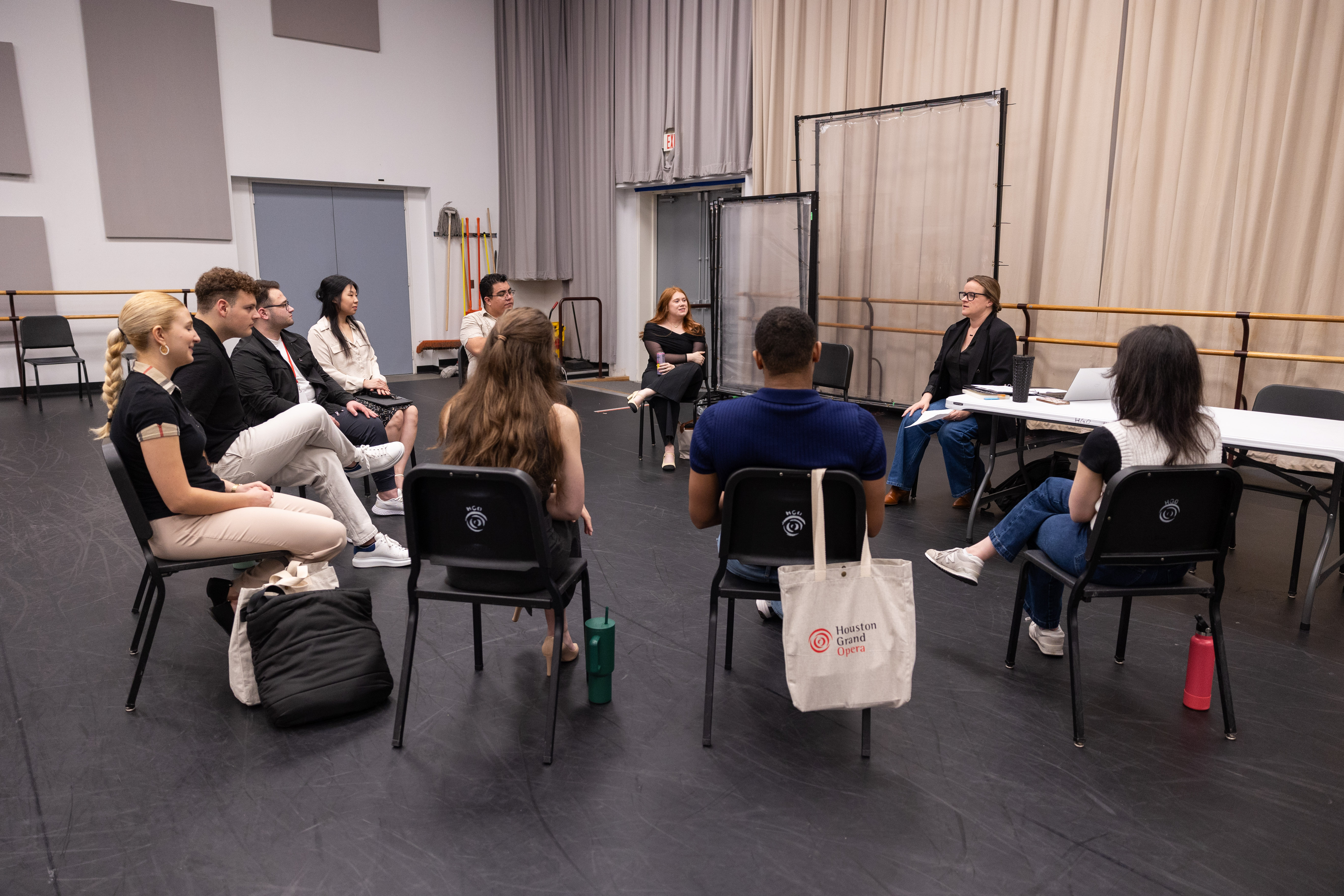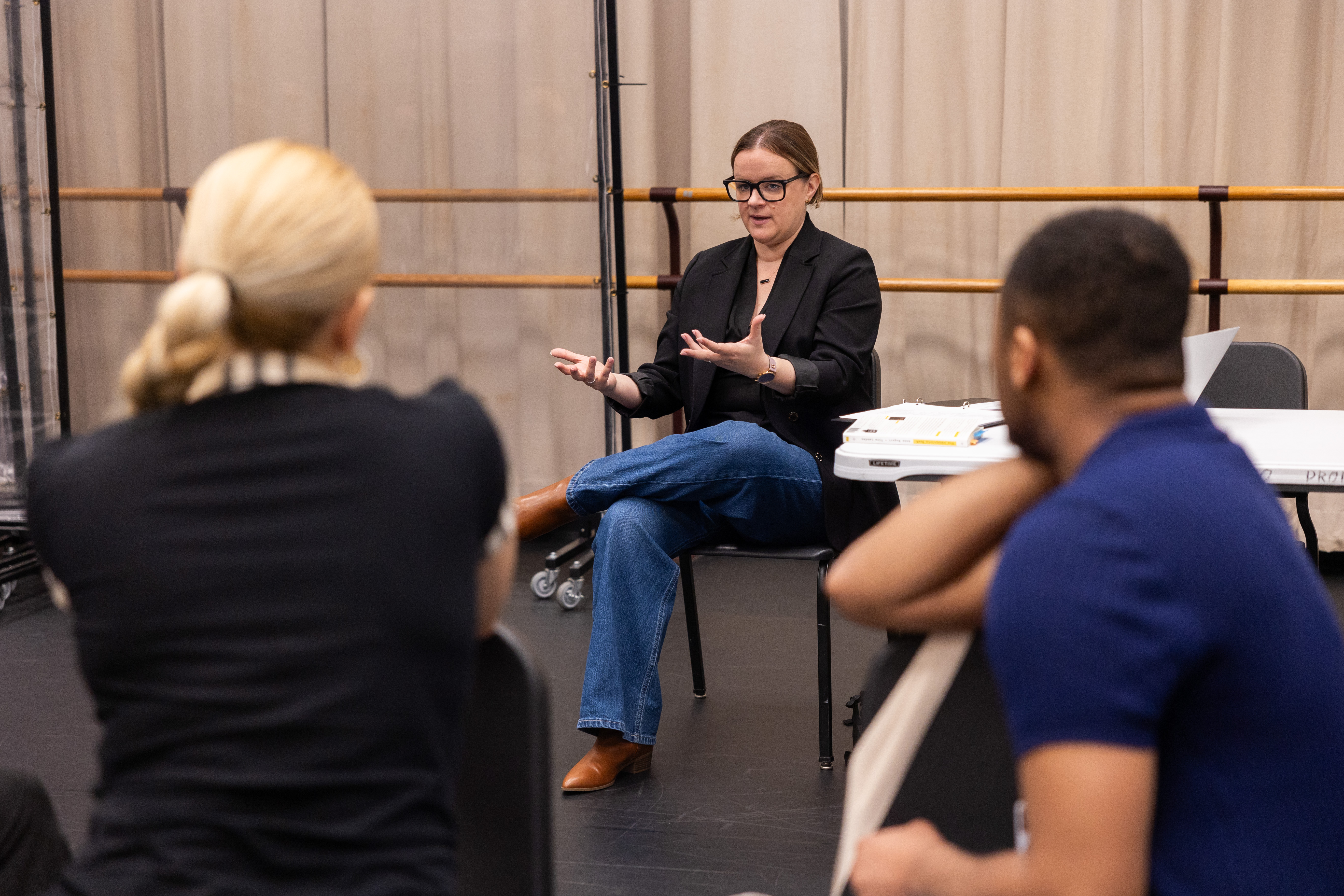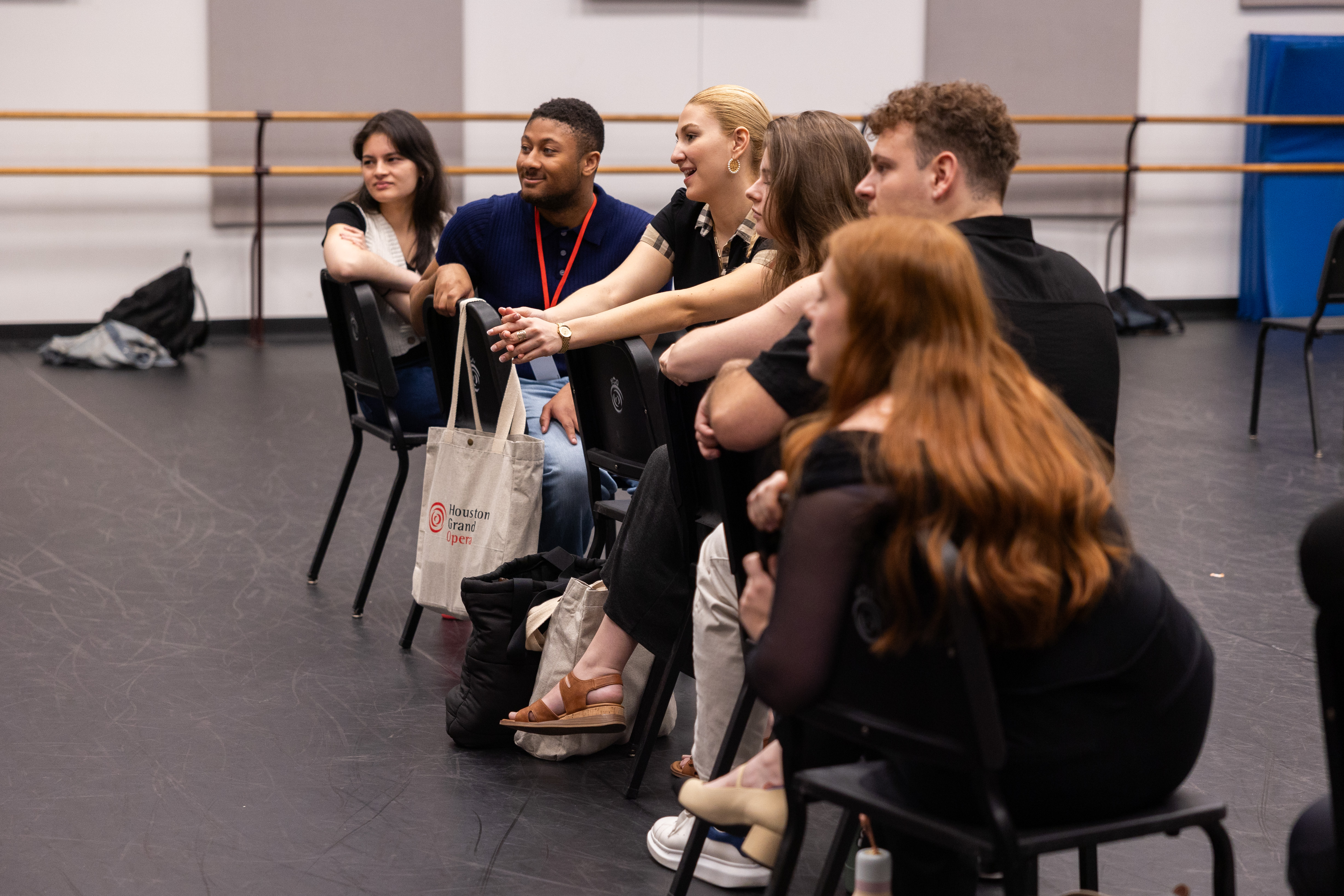10 Ways YAVA Puts Young Singers in the Driver’s Seat of Their Future
Apply to be part of HGO’s Young Artist Vocal Academy 2026 class! Applications open in January at HGO.org.
May 21, 2025—Each spring, Houston Grand Opera welcomes two groups of eight talented undergraduate singers to the Wortham Theater Center, where they each spend an intensive week of training, mentorship, and discovery through the company’s Young Artist Vocal Academy. That’s 16 total artists, coming to Houston from all over the country and the world. These are singers at a pivotal moment: finishing or just finished with their undergraduate degrees, beginning to look seriously at what comes next.
Having wrapped week one with a gifted group, we are now hosting our second cohort, and it feels like the perfect time to reflect on what makes YAVA so special. Simply put, it is unlike any other program for singers at this stage. Because it’s housed inside a major opera company, it offers not only high-level training but also a front-row seat to how a large company works and what a real career in opera looks like. In undergrad, students are rightly focused on foundational skills—but YAVA steps in at the exact right moment to connect those skills to the professional world. It’s not just about preparing for the next degree or program; it’s about understanding what kind of artist you want to be, and what kind of career you want to build.
Even the act of applying to YAVA tells us a lot. It means these singers are motivated, curious, and ambitious. They want to understand the bigger picture. They want to connect the dots. And they want to move forward with clarity and confidence.
One of the most powerful things we see is that transformation: a young singer who walks in as a student and leaves with the mindset of a professional—someone no longer waiting to be told what to do, but actively making choices, thinking critically, and shaping their artistic future.
A big part of this is what we jokingly call becoming an operatic triple threat. In musical theater, that phrase means someone can sing, act, and dance. In opera, it means vocal technique, musical depth, and dramatic truth—three pillars of performance that these singers spend their week at YAVA exploring from every angle. But just as important is what happens alongside that: they begin to think like entrepreneurs, collaborators, communicators, and leaders. It’s that combination—artistry and agency—that makes the difference.
From technical mastery to real-world perspective, here are ten ways YAVA puts young artists in the driver’s seat of their future:
The operatic voice has to do something extraordinary: fill a theater, project over an orchestra, and do it all without amplification. And that’s not just about power—it’s about presence, color, clarity, and longevity. At YAVA, singers work closely with Dr. Stephen King, one of the most respected voice teachers in the business. Through hands-on, high-level technical work, they develop a deep understanding of their own anatomy and how to build a sustainable, expressive instrument. Dr. King equips our young singers with the tools to navigate their vocal development with precision and confidence.
Acting in opera presents unique challenges. The timing is fixed, the language often foreign, and yet the audience expects something alive, honest, and deeply felt. At YAVA, singers receive comprehensive acting training. With the guidance of teaching artists from the Alley Theatre's professional ensemble, they explore movement, improvisation, and physical storytelling. Then, working closely with operatic director Stephanie Havey, they learn how to translate those tools into the world of opera. She helps them navigate dramatic choices in their arias, dive into the repertoire, and unify music, text, and staging into something personal and compelling. Casting directors are looking for artists who can carry an entire evening onstage with truth, presence, and dramatic clarity—and this kind of preparation makes that possible.

Musicianship is the soul of a compelling opera performance. It’s what gives depth, specificity, and humanity to what’s on the page. And for casting directors and conductors, musical intelligence is as important as vocal power when it comes to casting. YAVA gives singers the opportunity to explore this dimension in depth. Working with Maureen Zoltek, Music Director of the Butler Studio, and members of HGO’s stellar music staff, they learn how to bring a score to life with nuance and imagination. They’re encouraged to make interpretive decisions, to experiment, and to understand the emotional shape of the music. The focus is on developing independent artistry—not waiting for instructions, but learning how to listen, shape, and lead musically.
There’s no single path to a career in opera. Some singers go to graduate school. Some move directly into young artist programs. Others carve their own route entirely. That’s why YAVA brings in professionals from a wide range of backgrounds to help singers explore their options. They meet with leaders from Rice University (Josh Winograde and Nino Sanikidze), University of Houston (Daniel Belcher), and Indiana University (Kelly Markgraf), each offering a distinct approach to advanced training. Conversations with current Butler Studio artists—some of whom skipped grad school altogether—offer even more perspectives on the many pathways available to them. The point isn’t to prescribe a direction, but to help each singer make informed, confident decisions about what’s best for them as individuals.

One of the most valuable things a young artist can develop is the ability to make smart, strategic choices offstage as well as on. At YAVA, singers work with Tiffany Soricelli, a financial advisor who specializes in working with performers, to begin understanding how their financial decisions can support—or limit—their artistic goals. It’s about cultivating long-term choice and freedom: weighing the costs of graduate school, understanding how debt shapes choices, and building a plan for financial sustainability in a profession that can lack stability. It’s also about mindset—seeing themselves not just as performers, but as decision-makers. As professionals. As the ones in charge.
Every artist has a public identity—whether they’ve crafted it intentionally or not. Dorian Valenzuela, HGO’s digital marketing manager, leads a session on personal branding and social media. Singers learn to assess how they show up online, how to align their digital presence with their artistic identity, and how to communicate clearly, professionally, and authentically. They learn to make sure their work—and their values—come through.
Because YAVA takes place inside a working opera company, singers don’t just rehearse—they observe, absorb, and connect with the people who make opera happen at every level. They meet with HGO’s General Director, the Director of Artistic Planning, the Production Director, the community engagement team, members of the development staff, and even the donors who support the work. They see how casting decisions are made, how productions are built, and how artists contribute to—and are supported by—the broader ecosystem of a company. That knowledge helps them walk into their next opportunity with confidence and context.

At YAVA, singers are invited to consider the bigger picture—what their work means beyond the stage. They talk about the role of the arts in society, and how opera can challenge, inspire, and build bridges between people. Art matters when it reflects our shared humanity, when it sparks emotion, and when it brings people into deeper connection with themselves and each other. Through conversations about community engagement and purpose-driven artistry, singers begin to see how their voices can serve something greater—not as a side project, but as a vital part of being an artist.
Opera is a collaborative art form—and relationships matter. YAVA gives singers the chance to build real connections with faculty, staff, artists, donors, and each other. The colleagues they meet here are future collaborators, allies, and sources of insight—a professional family they can grow with for years to come.

This is the core of it all. Over the course of the week—through coachings, conversations, and reflection—something shifts. These singers begin to trust themselves more. They become more grounded in who they are, what they care about, and how they want to express it. They leave not just with more skills, but with more clarity, more confidence, and a deeper understanding of their voice—both literally and metaphorically—and how to use it in the world.
YAVA isn’t just a training program, it’s a launching pad. It’s where young singers step into their artistry with focus, courage, and momentum. In a world racing speedily toward the virtual and artificial, opera remains 100% human-powered—built on breath, presence, and truth. Our young artists aren’t just learning to perform—they’re learning to lead, to connect, and to carry forward an art form that reminds us what it means to be fully, powerfully human.